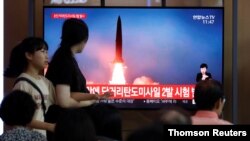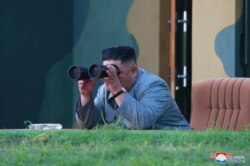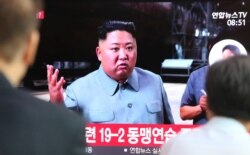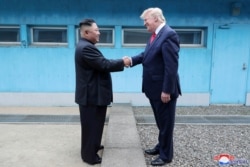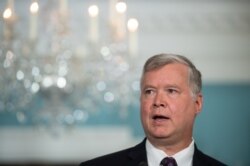North Korea's unrelenting missile launches are intended to strategically signal to Washington that the North will continue to develop weapons and weaken U.S. demand for denuclearization, said experts.
"The strategy I discern is to divide the American side and weaken the [U.S.] resolve to force the North to denuclearize," said Douglas Paal, vice president at the Carnegie Endowment for International Peace.
North Korea conducted another missile test on Saturday, its seventh launch in a month. The tests were conducted despite a promise that North Korean leader Kim Jong Un made in a letter to U.S. President Donald Trump earlier this month that the launches will stop once military exercises between the U.S. and South Korea are over. The drills concluded last week.
Kim, who supervised the missile launch, said there is a "need to push ahead with an indomitable offensive campaign," according to the country's official Korean Central News Agency (KCNA) on Saturday.
Kim added that North Korea will "step up the development of Korean-style strategic and tactical weapons for resolutely frustrating the ever-mounting military threats and pressure offensive of hostile forces," said KCNA, apparently referring to the U.S. and South Korea.
Experts said Pyongyang is demonstrating through its missile launches that it intends to continue its missile and nuclear weapons programs without yielding to Washington's demand for denuclearization, contradicting Kim's pledge to denuclearize last year.
"There is consistent strategy to North Korean missile tests," said Robert Manning, a senior fellow at the Atlantic Council. "They are seeking to strengthen their conventional and nuclear deterrent.”
North Korea has conducted nine missile tests since May. The launches suggest that the country has developed advanced missile technology that can evade pre-emptive strikes aimed at destroying missiles prior to launches as well as missile defense systems designed to intercept incoming weapons in flight.
Since coming to power in 2011, Kim has tested more than 90 missiles and four nuclear weapons, exceeding the combined number of weapons that his father Kim Jong Il and grandfather Kim Il Sung, who ruled North Korea as dynastic leaders, launched over 27 years.
North Korea also apparently has developed a miniaturized nuclear warhead, said the Reuters news agency, citing Japanese newspaper Yomiuri last week that reported on Tokyo's annual Defense White Paper, that is being officially released in September.
A report published last week by the International Atomic Energy Agency (IAEA) said North Korea was developing nuclear weapons in 2018 even as it held talks with the U.S., which the United Nations (U.N.) watchdog said was a clear violation of Security Council resolutions. The IAEA plans to submit the report to the 74th U.N. General Assembly in New York in September.
"It appears that Kim is playing Trump to bolster his missile and nuclear capabilities at no cost," said Manning. "While President Trump would undoubtedly like to realize a denuclearization deal, it appears that Kim has concluded that as long as he doesn't test nukes or intercontinental ballistic missiles (ICBMs), and the Korean Peninsula is relative quiet, Trump will tolerate the status quo through the 2020 [U.S. presidential] election."
In response to North Korea's latest missile launch on Saturday, Trump said, "I'm not happy about it" during a sideline meeting with Japanese Prime Minister Shinzo Abe at the Group of 7 in France on Sunday.
But Trump continued that Kim is "not in violation of any agreement" promising him that he will not test ICBMs capable of reaching the U.S. mainland.
Trump has been downplaying North Korea's missile tests conducted since the breakdown of the Hanoi Summit in February when Kim failed to secure sanctions relief from Trump in exchange for a partial denuclearization.
Gary Samore, former White House coordinator for arms control and weapons of mass destruction during the Obama administration, said the prospect for North Korea to denuclearize is close to none anytime soon.
"There is no prospect for achieving denuclearization of North Korea for the foreseeable future," said Samore. "The best outcome that can be achieved is an interim agreement to limit North Korean production of nuclear weapons and long-ranging missiles."
North Korea, however, still wants sanctions relief, according to Paal, who added, "So it may be willing to take some, partial steps" toward denuclearization.
In an article carried by KCNA on Saturday, North Korea said it does not want to give up the country's missile and nuclear weapons programs, which it sees as essential for its government's survival, for any sanctions relief.
"The U.S. should clearly understand that we do not have a lingering attachment on sanctions relief," said KCNA. "We will never barter the strategic security of the country for the sanctions relief."
Manning said, "The North Korean statement is an effort to increase their bargaining power and a rejection of the U.S. all-or-nothing' position," referred to as Washington's big deal approach that asks North Korea to give up all of its nuclear weapons in exchange for lifting sanctions.
Manning continued, "They will not give up their weapons of mass destruction for the lifting of sanctions. They want to bid up the price."
Samore, however, said, "I don't think the recent tests will increase North Korea's leverage in upcoming U.S.-South Korean nuclear talks."
The talks between Washington and Pyongyang has been stalled since the failed Hanoi Summit, but when Trump and Kim held an impromptu summit at the inter-Korean border in June, the two agreed to resume talks. Trump said Kim also promised in the letter he received this month that he "would like to meet and start negotiations" as soon as the joint military drills are over.
However, even when U.S. Special Representative Steve Biegun was in Seoul last week, North Korea did not show any interest in having talks with him, instead testing missiles on Saturday.
Manning said, "The fact that Pyongyang won't even come to the table despite sincere efforts by U.S. North Korea Envoy Steven Biegun raises questions about how serious they are in the first place."
Trump, while attending the recently concluded G-7 summit on Monday, said North Korea has "tremendous potential" under Kim and that it doesn't want to blow it. "Because if they blow it, it won't be good," said Trump.




